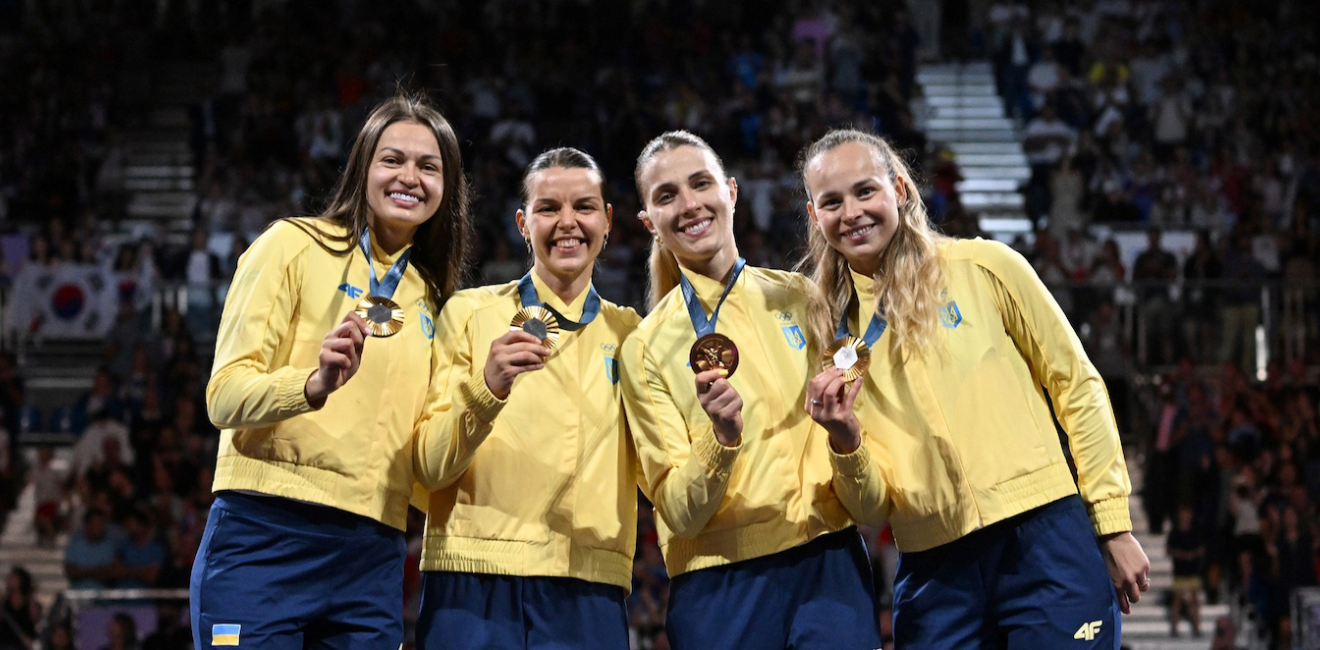
A blog of the Kennan Institute
"Since we don't have a recording of the national anthem of Ukraine, will it be a problem if in honor of Baiul the national anthem of Russia is played?"
In 1994, when figure skater Oksana Baiul became the first Olympic champion from independent Ukraine, a Ukrainian win was so foreign that the organizers didn't have a recording of the country’s national anthem to play during the medal ceremony. Thirty years ago, Ukraine's athletes had to overcome external barriers to assert their presence and voice in the global sporting arena. The same is no less true today.
Ukraine's presence at the Paris 2024 Olympic Games is marked by the participants’ athletic prowess, on the one hand, and by the profound impact of the ongoing war on the other. Under the official slogan "The Will to Win," Ukraine's Olympic team of athletes, the smallest in the country’s history, carries a message of resilience and hope to a global audience.
A Nation's Struggle Reflected in Sport
Ukraine prepared for these Olympics in the context of unfathomable adversity. More than 500 sports facilities have been damaged or destroyed by Russian shelling, including fifteen Olympic training bases. The estimated cost of rebuilding them exceeds $300 million.
Among the severely damaged facilities is the Dnipro sports school, home to the reigning world champion, world record-breaker, and Paris 2024 Olympic champion in the women’s high jump, Yaroslava Mahuchikh. “Fragments of an enemy rocket hit the Dnipro sports school, where my sports career began, where my first records were set. I call on the whole world, all of Europe, to pay attention to another terrorist act by Russia,” she said.
The southern city of Kherson, once a main center for Olympic-level rowing, finds itself on the front lines of war along the Dnipro river. Though Kherson was liberated in November 2022, the left bank and much of the region remain under Russian occupation.
Russia’s destruction of the Kakhovka Dam in June 2023 caused widespread flooding across Kherson krai, washing land mines and chemical contaminants into both the Dnipro river and the Black Sea. All 200 children and fifteen coaches involved in rowing in Kherson evacuated the city. The region now lies deserted of civilians, as fighting and bombings continue.
Ukraine’s Fallen Athletes
Tragically, the toll extends beyond infrastructure and training facilities. Since the beginning of Russia’s aggression against Ukraine, over 500 Ukrainian athletes and coaches have lost their lives, including twenty world champions, among them eight child athletes. Many athletes have enrolled in Ukraine’s fighting forces and have lost their lives while defending Ukraine.
The dead include the twenty-two-year-old boxer Maksym Galinichev, who took a silver medal at the 2018 Summer Youth Olympics and died fighting in Luhansk oblast; the weightlifter Oleksandr Pielieshenko, two-time European champion who competed for Ukraine at the 2016 Rio Olympics; and pistol shooter Ivan Bidnyak, who earned numerous European medals, competed as an Olympian, and was killed during a combat mission in Kherson oblast.
Currently, more than 3,000 athletes are fighting in the ranks of the Defense Forces of Ukraine.
Athletes as Symbols of National Resilience
Ukrainian athletes who continue to compete in sports must contend with the impact of the war—and with competitors from the enemy country.
Among the fifteen Russian athletes participating in the Paris 2024 Olympics as Individual Neutral Athletes, at least ten have violated Ukrainian territorial integrity and publicly supported the Russian war against Ukraine. This group includes Tamara Dronova and Alyona Ivanchenko, cyclists who trained and competed in occupied Crimea, and Angela Bladtseva, a trampoline athlete who took part in a pro-war event in Krasnodar, Russia, against the backdrop of the military symbol "Z" and the propaganda slogan “We don't abandon our own.”
Many see the Olympic Committee’s inclusion of these athletes, even under neutral status, as a subtle legitimization of Russia’s actions against Ukraine.
Despite the cloud of geopolitical acrimony hanging over Paris, the Ukrainian national Olympic team, which consists of just 140 athletes—the smallest team in Ukraine's Olympic history—has stepped up to compete for medals.
On July 29, Ukrainian fencer Olha Kharlan won a bronze medal, securing Ukraine's first medal of the Paris Games. Kharlan’s story illustrates the deep tensions making their way into competition: in 2023 she was disqualified at the World Fencing Championship in Milan for refusing to shake hands with her Russian opponent, Anna Smirnova, whose brother serves in the Russian army.
The war and its ramifications are never far from Ukrainian Olympians’ minds. As Kharlan said after winning bronze, "It's a completely different medal; it's bronze, but for me, it's gold. No matter what medal it is, for me, it's gold. Given the conditions, considering where our country is right now, what we're going through. . . . It's indescribable. It's very difficult."
Five days later, Olha Kharlan won the first Olympic Gold for Ukraine at the Paris 2024 Games as part of the saber fencing team with Olena Kravatska, Alina Komashchuk, and Yuliia Bakastova.
Beyond Medals
Beyond the medals and records, Ukraine's participation in the Paris Olympics is a poignant reminder of the human cost of war. Zhan Beleniuk, Olympic champion and the first Black member of the Ukrainian parliament, emphasizes the importance of leveraging the Olympics as a venue for messaging: "There should be Ukrainians at the competitions who will talk about what Russia is doing in Ukraine, how it kills civilians, how many athletes have died, and how much sports infrastructure has been destroyed. The neutral status of Russian athletes is fake, and we have to do a lot of diplomatic work directly at the Olympic Games," he said.
As Ukrainian athletes compete at the 2024 Olympics, their struggle is not merely about athletic prowess. It is also about manifesting resilience in the face of unprecedented challenges, symbolizing the nation's enduring spirit. Their achievements inspire unity and hope among Ukrainians, offering a powerful platform for Ukraine to assert its identity on the global stage.
The opinions expressed in this article are those solely of the author and do not reflect the views of the Kennan Institute
Author


Kennan Institute
After more than 50 years as a vital part of the Wilson Center legacy, the Kennan Institute has become an independent think tank. You can find the current website for the Kennan Institute at kennaninstitute.org. Please look for future announcements about partnership activities between the Wilson Center and the Kennan Institute at Wilson Center Press Room. The Kennan Institute is the premier US center for advanced research on Eurasia and the oldest and largest regional program at the Woodrow Wilson International Center for Scholars. The Kennan Institute is committed to improving American understanding of Russia, Ukraine, Central Asia, the South Caucasus, and the surrounding region through research and exchange. Read more

Explore More in Focus Ukraine
Browse Focus Ukraine
Talking to the Dead to Heal the Living

Ukrainian Issue in Polish Elections


